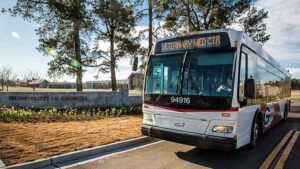Be Safe on Board
Transportation & Parking Services is committed is making sure you are safe and secure while using our services. UGA buses move millions of passengers annually while being recognized as one of the safest systems in the nation. Safety is a shared responsibility, and as our operators focus on getting you to your destination, be sure that you do your part to keep campus moving safely.
Before Boarding the Bus
- Be prepared to ride. Wait at designated stops and stay back from the curb until the bus comes to a complete stop. Drivers only stop at designated stops to ensure we meet you at safe locations.
- Never run alongside the bus or hit vehicle windows once the bus has pulled off. The next bus isn’t too far behind, and doing so is extremely hazardous. Buses will not stop again to admit latecomers.
- Never assume the bus operator sees you. Our operators are well trained and remain vigilant at all times, but obstacles can obstruct their view. It is always wise to make yourself visible to approaching buses, especially early in the morning or late at night.
- Allow passengers to exit before boarding. Do not push in the doorways.
Once on Board
- Move to the center and rear of the vehicle. Federal law prohibits the operation of the vehicle while passengers are standing forward of the yellow standee line.
- Hold On or Be Seated. Buses may stop or start suddenly. Young children must be seated while the bus is in motion.
- Keep aisles free of luggage or personal items. Strollers must be folded and stowed out of the aisle.
- In the unlikely case of an emergency, Look, Listen, and Respond! Familiarize yourself with the locations of emergency exits and on-board safety equipment. Listen carefully to operator instructions. Bus operators are trained in emergency procedures.
After Exiting the Bus
- Wait for the bus to depart before crossing the street. Buses are large and may obstruct the view of other motorists.
- Cross at designated crosswalks and look both ways before crossing the street.
Respect the Ride on UGA Buses
Transportation & Parking Services (TPS) wants everyone to feel safe and comfortable while on-board our vehicles. We believe it is our obligation to work in coordination with our passengers to ensure we all treat each other with respect and ensure a safe environment. Learn more about our polices and expectations while riding our buses.
Prohibited Activities
Per O.C.G.A. § 16-12-120
- Please note that the following are prohibited while riding TPS vehicles:
- Consuming or possessing food or drink, unless in a resealable plastic container.
- Smoking, vaping, or utilizing e-cigarettes.
- Carrying or possessing hazardous materials, explosives, or other dangerous articles.
- Utilizing sound devices without headphones.
- Entering the driver compartment of a UGA transportation vehicle.
- Carrying a live animal, except for service animals.
- Possessing any wheeled motorized device, except as authorized in the Wheeled Mobility Device Policy.
Passengers are advised that TPS may impose additional restrictions as conditions require. Failure to comply with these policies may result in removal from UGA transportation vehicles.
See & Say
Your feedback is important to us. If you see something that you feel is suspicious or out of place, you are encouraged to alert an operator, TPS employee, or contact UGA Police by dialing 911 or using the UGA SAFE mobile app.
Audio / Visual Surveillance Policy
All TPS vehicles are equipped with audio/video security equipment. This equipment remains on at all times while the vehicle is running. Vehicles equipped with security equipment include signs or decals posted in various locations on the interior of the vehicle to advise riders of the presence of such equipment. Access to recordings made by this equipment is limited to TPS supervisory staff and may be used for the following purposes:
- Incident or accident investigation
- Maintenance
- Random checks to ensure staff compliance with laws, policies, procedures, and other regulations
- Video and bus recordings will occasionally be utilized for research purposes, with passengers being de-identified.
When needed, such recordings may be disclosed to law enforcement agencies to be used as evidence in their investigations.